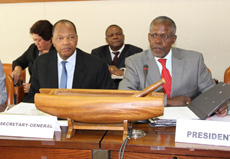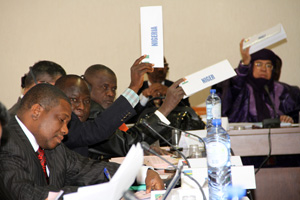PRESS RELEASE: ACP Members of Parliament urge more understanding from Europe on free trade agreements
 Brussels, 22 March 2012/ ACP: Spirited calls from Parliamentary Members of the African, Caribbean and Pacific Group of States have appealed for flexibility, empathy and “practical reason” from European authorities, regarding stalled free trade negotiations with their regions.
Brussels, 22 March 2012/ ACP: Spirited calls from Parliamentary Members of the African, Caribbean and Pacific Group of States have appealed for flexibility, empathy and “practical reason” from European authorities, regarding stalled free trade negotiations with their regions.
Delegates from 79 African, Caribbean and Pacific (ACP) countries today wrapped up official visits in Brussels, Belgium, where they concluded the 27th session of the ACP Parliamentary Assembly and held talks with European MPs in preparation for the 23rd ACP-EU Joint Parliamentary Assembly scheduled for 28 – 30 May in Horsens, Denmark.
At the plenary session, members voiced deep concerns over the status of Economic Partnership Agreements (EPAs), aimed at phasing in free trade between Europe and the ACP regions.
“The EPA negotiations must begin from the premise that the Cotonou Agreement [the framework for relations between ACP and EU states] is about regional integration and getting ACP members to integrate successfully into the world economy. Any aspects of EPAs threatening regional integration must be avoided,” said the President of the ACP Parliamentary Assembly, Hon. Musikari Kombo.
“Moreover, EPA negotiations are negotiations. One must not give ultimatums – if you look at other free trade negotiations such as the DOHA which are ongoing, ultimatums are not given. In this case, members of the ACP Parliamentary Assembly are apprehensive of policies imposed on our countries that could threaten economic integration and our livelihoods.”
Although ACP countries deal with EPAs as regional blocks, members within those blocks are at varying stages of development and facing different levels of progress in negotiations.
This is complicated by a proposal from the European Commission to withdraw Market Access Regulation 1528/2007 of the European Council, thus setting a deadline for countries to ratify their EPAs by 1 January 2014, or risk losing their duty free, quota free access to European markets.
Opening the parliamentary talks, ACP Secretary General Dr Mohamed Ibn Chambas said it was important to conclude the EPAs successfully, but called for a “dose of empathy, enlightenment and practical reason” amongst European counterparts in the negotiating process.
“It is a matter of regret that the EU has imposed such a unilateral deadline which seems in opposition to the letter and very spirit of our time-tested relationship. Even worrisome is the fact that they seem to be imposing terms that some economists even in Europe are decrying as being above even what the WTO would be prepared to impose,” Dr Chambas told the Assembly.
“There seems to be not much understanding in the Berlaymont of the fact that several of our regions are only now completing their customs unions, which are a pre-condition for regional communities to be able to coordinate a common EPA position. In light of the de-industrialising effects of wholesale trade liberalisation, the reluctance to include a development component to the EPAs as some of our regional communities have insisted all along remains a disappointing reality.”
So far, only one out of the six main economic regions of the ACP Group – the Caribbean – has signed a comprehensive EPA. The accord works to facilitate free trade between Europe and the ACP regions, with an aim to liberalise at least 80% of trade in goods over a 15 year period. Today, ACP states still benefit from non-reciprocal duty free and quota free access to European markets as developing countries./ END
(Pictured top: ACP Secretary General Dr Mohamed Ibn Chambas (left) and President of the ACP Parliamentary Assembly Mr Musikari Kombo/ Above: Members of the ACP Parliamentary Assembly at its 27th plenary session in Brussels)
***
